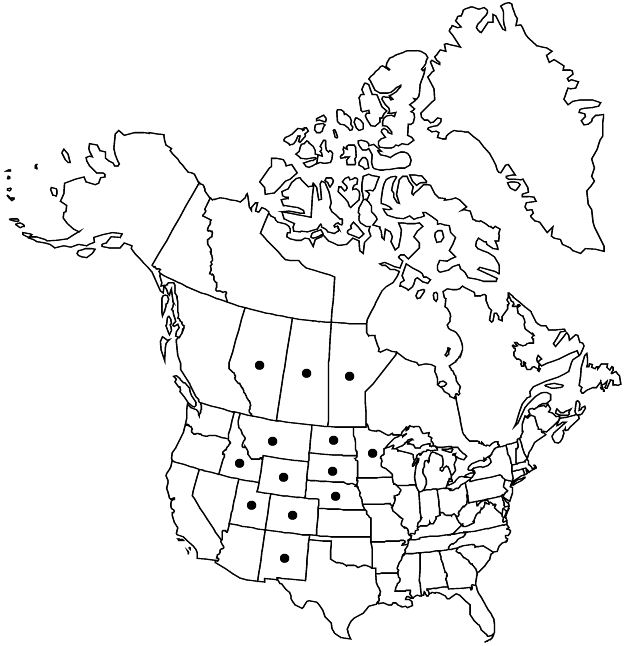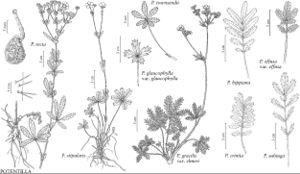Difference between revisions of "Potentilla effusa var. effusa"
FNA>Volume Importer |
FNA>Volume Importer |
||
| Line 1: | Line 1: | ||
{{Treatment/ID | {{Treatment/ID | ||
|accepted_name=Potentilla effusa var. effusa | |accepted_name=Potentilla effusa var. effusa | ||
| − | |accepted_authority= | + | |accepted_authority= |
|publications= | |publications= | ||
|basionyms= | |basionyms= | ||
| Line 7: | Line 7: | ||
|name=Potentilla effusa var. filicaulis | |name=Potentilla effusa var. filicaulis | ||
|authority=Nuttall | |authority=Nuttall | ||
| + | |rank=variety | ||
}} {{Treatment/ID/Synonym | }} {{Treatment/ID/Synonym | ||
|name=P. hippiana var. filicaulis | |name=P. hippiana var. filicaulis | ||
|authority=(Nuttall) B. Boivin | |authority=(Nuttall) B. Boivin | ||
| + | |rank=variety | ||
}} | }} | ||
|hierarchy=Rosaceae;Rosaceae subfam. Rosoideae;Rosaceae tribe Potentilleae;Potentilla;Potentilla sect. Leucophyllae;Potentilla effusa;Potentilla effusa var. effusa | |hierarchy=Rosaceae;Rosaceae subfam. Rosoideae;Rosaceae tribe Potentilleae;Potentilla;Potentilla sect. Leucophyllae;Potentilla effusa;Potentilla effusa var. effusa | ||
| Line 25: | Line 27: | ||
|elevation=700–2600 m | |elevation=700–2600 m | ||
|distribution=Alta.;Man.;Sask.;Colo.;Idaho;Minn.;Mont.;Nebr.;N.Mex.;N.Dak.;S.Dak.;Utah;Wyo. | |distribution=Alta.;Man.;Sask.;Colo.;Idaho;Minn.;Mont.;Nebr.;N.Mex.;N.Dak.;S.Dak.;Utah;Wyo. | ||
| − | |discussion=<p>Variety effusa occurs from southern Alberta to Manitoba southward on plains and in the mountains to central Colorado. Disjunct populations from northern foothills of the Uinta Mountains in Utah are included in < | + | |discussion=<p>Variety effusa occurs from southern Alberta to Manitoba southward on plains and in the mountains to central Colorado. Disjunct populations from northern foothills of the Uinta Mountains in Utah are included in <i></i>var.<i> effusa</i> by B. C. Johnston (1980), but relegated to <i>Potentilla hippiana</i> by N. H. Holmgren (1997b). Verification is needed for single occurrences of the variety mapped by Johnston in eastern Idaho, northwestern Nebraska, and north-central New Mexico, without citation of specimens. A single collection from Valley County, Idaho, (E. A. Christenson 42, CONN) is almost certainly an introduction of unknown persistence.</p><!-- |
--><p>The small, narrow, cottony-floccose epicalyx bractlets tend to be glabrescent at least distally, contrasting with the sharply acuminate sepals. Variety effusa, in its most distinctive form, has unevenly pinnate leaves with coarsely toothed gray leaflets that are equally cottony-floccose on both surfaces.</p><!-- | --><p>The small, narrow, cottony-floccose epicalyx bractlets tend to be glabrescent at least distally, contrasting with the sharply acuminate sepals. Variety effusa, in its most distinctive form, has unevenly pinnate leaves with coarsely toothed gray leaflets that are equally cottony-floccose on both surfaces.</p><!-- | ||
| − | --><p>Collections of otherwise typical < | + | --><p>Collections of otherwise typical <i></i>var.<i> effusa</i> from central Wyoming and adjacent Montana are uniformly smaller than average with only one to four teeth per side of the leaflets. These occur mainly on limestone outcrops (1300–2600 m elevation) and might qualify as a distinct variety.</p> |
|tables= | |tables= | ||
|references= | |references= | ||
| Line 36: | Line 38: | ||
-->{{#Taxon: | -->{{#Taxon: | ||
name=Potentilla effusa var. effusa | name=Potentilla effusa var. effusa | ||
| − | + | |authority= | |
| − | |authority= | ||
|rank=variety | |rank=variety | ||
|parent rank=species | |parent rank=species | ||
| Line 51: | Line 52: | ||
|publication year= | |publication year= | ||
|special status= | |special status= | ||
| − | |source xml=https://jpend@bitbucket.org/aafc-mbb/fna-data-curation.git/src/ | + | |source xml=https://jpend@bitbucket.org/aafc-mbb/fna-data-curation.git/src/f50eec43f223ca0e34566be0b046453a0960e173/coarse_grained_fna_xml/V9/V9_237.xml |
|subfamily=Rosaceae subfam. Rosoideae | |subfamily=Rosaceae subfam. Rosoideae | ||
|tribe=Rosaceae tribe Potentilleae | |tribe=Rosaceae tribe Potentilleae | ||
Revision as of 22:39, 16 December 2019
Leaflets gray to white, teeth (1–)4–9 per side, abaxial surfaces moderately long-hairy especially on veins, moderately to densely cottony, adaxial moderately long-hairy and abundantly cottony. Flowers: epicalyx bractlets and sepals usually abundantly cottony at least proximally; anthers (0.6–)0.7–1 mm. 2n = 56.
Phenology: Flowering summer.
Habitat: Dry rocky slopes, slightly moist meadows, grasslands, oak, aspen, and montane conifer woodlands (limestone pavement)
Elevation: 700–2600 m
Distribution

Alta., Man., Sask., Colo., Idaho, Minn., Mont., Nebr., N.Mex., N.Dak., S.Dak., Utah, Wyo.
Discussion
Variety effusa occurs from southern Alberta to Manitoba southward on plains and in the mountains to central Colorado. Disjunct populations from northern foothills of the Uinta Mountains in Utah are included in var. effusa by B. C. Johnston (1980), but relegated to Potentilla hippiana by N. H. Holmgren (1997b). Verification is needed for single occurrences of the variety mapped by Johnston in eastern Idaho, northwestern Nebraska, and north-central New Mexico, without citation of specimens. A single collection from Valley County, Idaho, (E. A. Christenson 42, CONN) is almost certainly an introduction of unknown persistence.
The small, narrow, cottony-floccose epicalyx bractlets tend to be glabrescent at least distally, contrasting with the sharply acuminate sepals. Variety effusa, in its most distinctive form, has unevenly pinnate leaves with coarsely toothed gray leaflets that are equally cottony-floccose on both surfaces.
Collections of otherwise typical var. effusa from central Wyoming and adjacent Montana are uniformly smaller than average with only one to four teeth per side of the leaflets. These occur mainly on limestone outcrops (1300–2600 m elevation) and might qualify as a distinct variety.
Selected References
None.
